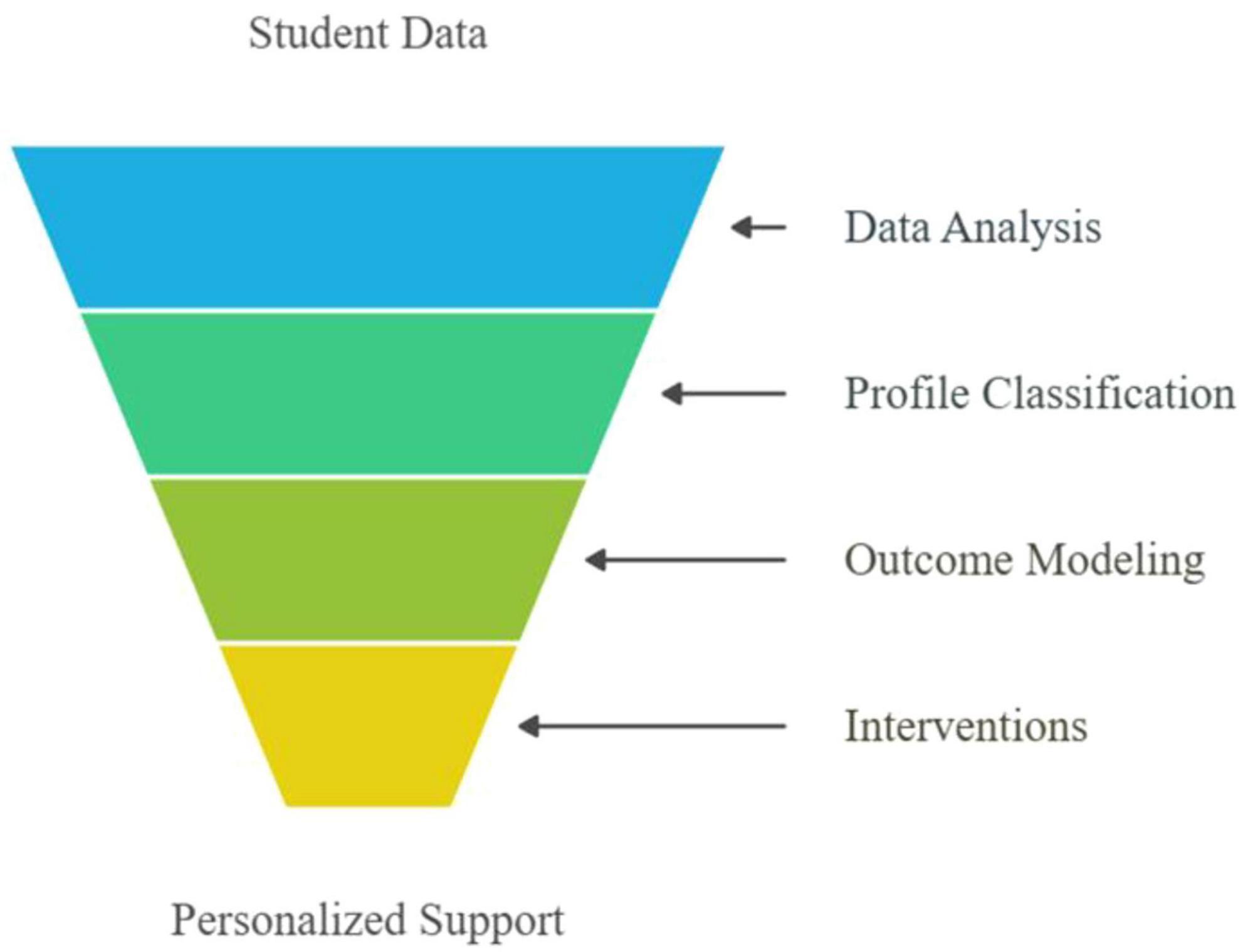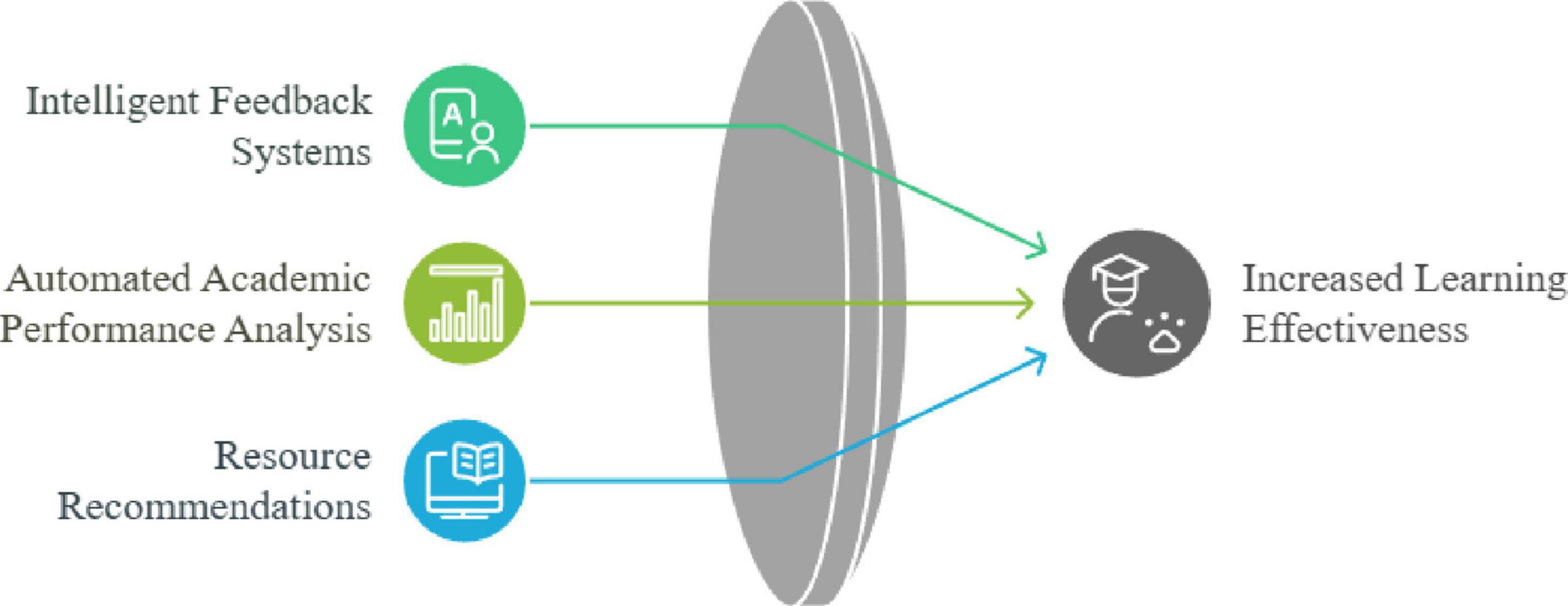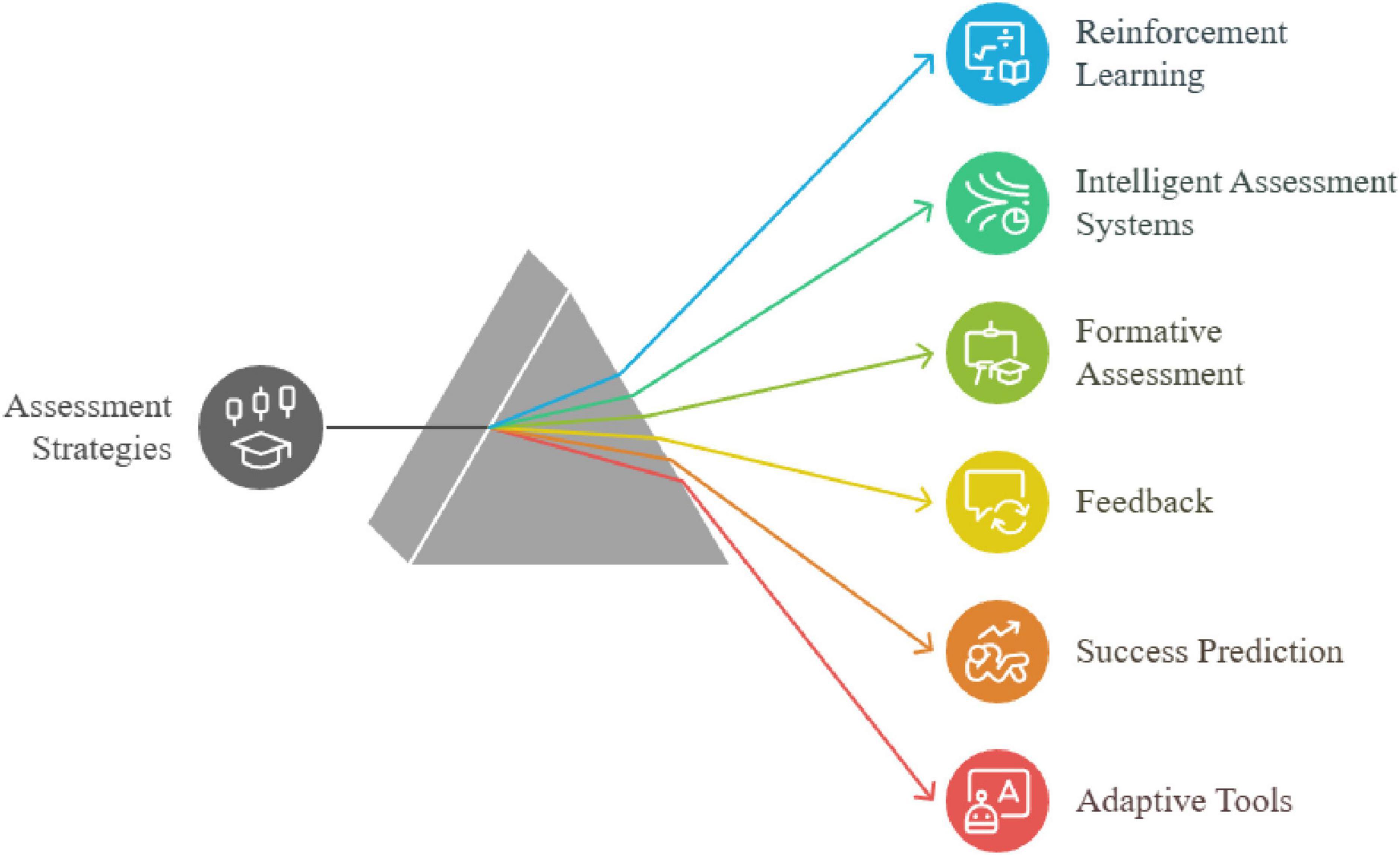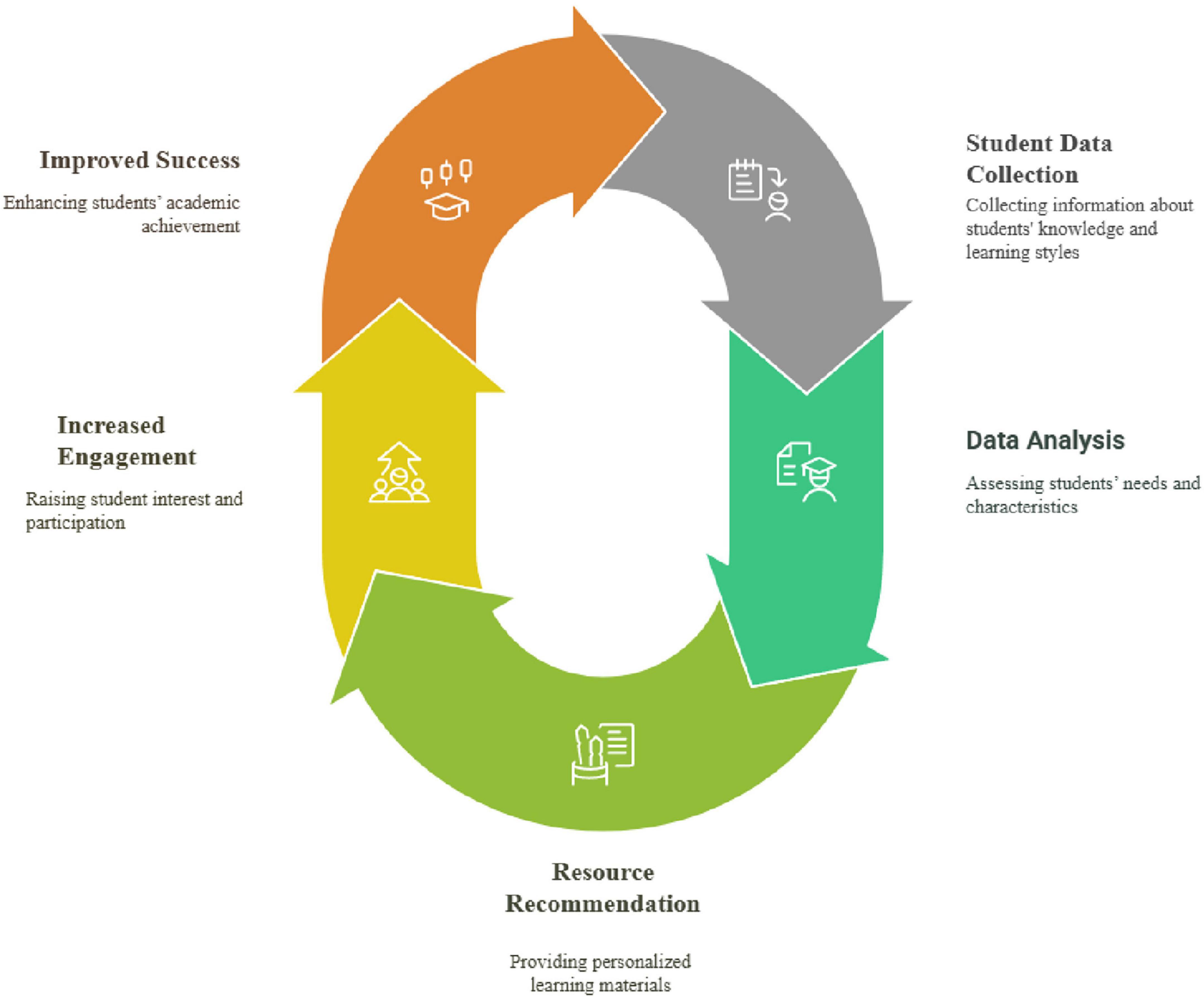- 1Zhetysu University named after Ilyas Zhansugurov, Taldykorgan, Kazakhstan
- 2Center of Excellence AEO “Nazarbayev Intellectual Schools”, Moscow City Pedagogical University, Moscow, Russia
This article examines the role of artificial intelligence (AI) models in the cognitive and learning activities of subjects in higher education institutions. The authors design this model using algorithms–sets of rules that enable programs to make decisions, recognize patterns, and generate predictions based on input data relevant to the learning and cognitive processes of university subjects. The aim of the study is to develop computer-based prototypes that simulate the processes of solving intellectual problems. These simulations help to deepen the understanding of such processes and to extract maximum information for future professional development and the construction of intelligent systems. Another key objective of artificial intelligence is to facilitate the execution of tasks characterized by a large number of variables, high complexity, and low suitability manually is systematized. The novelty of the study suggests in the personalization of the educational process for the learner, the application of adaptive cognitive learning strategies, and the incorporation of intelligent feedback mechanisms. The proposed model stands out from others due to the inclusion of components such as machine learning, intelligent tutoring systems, automated assessment systems, and large-scale data analysis. The article shows the possibilities of using AI to enhance engagement of students in forecasting their academic success and optimizing administrative processes. It also substantiates the need for the responsible use of AI in educational platforms, the development of integration strategies, and the assurance of fair access to resources.
Introduction
The integration of artificial intelligence (AI) into the educational and cognitive domains of universities represents a transformational shift aimed at improving educational quality, personalizing student learning experiences, and optimizing administrative processes. As AI becomes increasingly embedded in academic institutions, the implementation of innovative teaching methods and adaptive learning strategies becomes essential. The AI market is projected to exceed $20 billion by 2027, highlighting its growing influence on the competitive landscape of higher education (Zawacki-Richter et al., 2019).
This model includes different components of AI, like machine learning, intellectual systems of mentoring and automated mechanisms of feedback, contributing for creating personalized educational process considering the individual traits of students. Research shows that using these technologies can enhance involvement of students and improve their academic performance, which is expressed in increasing average score (GPA) up to 9%–14% (Verma, 2023). However, integration of AI in educational environment connected with a number of challenges, including confidentiality questions, ethical aspects and potential bias in algorithms (Sain et al., 2024). These problems raise critical essential questions on the need for responsible use of AI and develop ethical standards to protect interests of students (Abbasi et al., 2024).
The model also emphasizes collaborative learning and continuous assessment strategies, which not only engage students more actively but also support instructors in refining pedagogical practices (Atchley et al., 2024). As educational institutions increasingly rely on data-driven decision-making, equitable access to AI tools will be critical for addressing both academic and operational challenges (Qolamani and Mohammed, 2023).
There were changes about integration of AI in educational environment, especially last decade. At first, AI technologies were used for automation of daily routine’s tasks. Even so with development of technologies fields of using have expanded.
In 2018 Educause Horizon Report of AI and adaptive technologies were defined like key directions of progress of educational technologies, also predicted growth of usage AI in teaching and education by 43% between 2018 and 2022 (Theasu, 2024). Finding out about potential of AI has prompted universities to learn about its opportunities, what let to, that 99.4% higher educational institutes in USA admitted the AI as the most significant key of their competitiveness in the next 3 years perspective.
The main aim of implementation AI in education is not only in increasing quality of education, but in supporting teachers in improving methods of teaching. Despite disruptions caused by the COVID-19 pandemic, significant investments in AI tools during 2020 underscored a commitment to using technology to enhance learning (Sitterding et al., 2019). Real-world applications confirm AI’s effectiveness: AI-based recommendations have shown up to 80% accuracy when compared with expert assessments (Essel et al., 2022).
With developing technologies shows that from a simple automation to a creating personalized of educational experience, including individual traits of students (Pressbooks, 2024). Scientific studies [e.g., (Koyuturk et al., 2023; Shahzad et al., 2024)] highlight how AI significantly simplifies access to information, facilitates collaboration with peers, and supports engagement in digital communities.
That’s how, AI is not only an instrument for enhancing efficiency, as well transformational strength, which is formulate the future of education and facilitating the transition to personalized and continuous learning models (eLearning Industry, 2024).
Materials and methods
The aim of the research – analyze of computer models, imitating the cognitive processes of solving intellectual tasks, for deeply understanding of their entities and the further use of the obtained results in optimization professional development of subjects in educational environment of university and projecting intellectual systems.
Analyze these components of model AI in in educational-learning of university gives us a lot of advantages and results. For example,
(1) Enhancing the quality of learning:
Machine learning methods enable the development of adaptive educational programs that adjust to the individual needs of students, thereby increasing their engagement and motivation. The usage of algorithms for data analysis allows for the identification of the most challenging topics for students and adding some changes to learning curriculum.
(2) Effective feedback mechanisms:
AI-powered feedback systems contribute to providing more timely and accurate recommendations to students. Educators receive analytical data on the progress of the group, which allows for the adaptation of teaching methods to better suit the needs of the students.
(3) Personalized learning:
AI technologies enable personalized learning, helping each student to master the material at their own pace. Effective interaction with such systems motivates students and minimizes the risk of academic dropout.
(4) Development of collaboration and critical thinking:
Collaborative learning with AI fosters teamwork and interaction skills, which are particularly valuable in preparing students for real-world professional environments. The use of intelligent systems allows for the simulation of complex problems that require an interdisciplinary approach.
(5) Optimization of administrative processes:
Automation of tasks such as assessments, scheduling, and other administrative functions allows universities to focus more on enhancing the educational process. The analysis of big data helps predict academic success and plan resource allocation.
(6) Ethical aspects and fairness:
The use of AI in assessment strategies promotes a more objective and impartial evaluation of student performance, minimizing the influence of human bias.
This research shows is mainly of a review and analytical nature, directed to the systematization and critical interpretation existing approaches and empirical data. The study represents an essential contribution to the development of pedagogical theory and practice at the intersection of education and artificial intelligence.
Results
Usage of methods in machine learning
Machine learning plays a key role in data analysis, classification, and the modeling of student profiles. These methods enable the prediction of outcomes such as the likelihood of dropout or successful admission, allowing for timely interventions and personalized support throughout the educational process (Popenici and Kerr, 2017).
The algorithm for personalizing is based on the learning process is a multi-level analysis of student data. The first stage involves the collection and analysis of information regarding academic performance, attendance, activity on digital platforms, and other parameters. This is followed by the classification of student profiles, which allows for the identification of groups with varying learning needs. Based on the collected data, possible scenarios for the development of a student’s educational trajectory are modeled, including the prediction of academic failure risks. The final stage involves the implementation of interventions, such as the adaptation of learning content, the assignment of mentors, or the automatic recommendation of additional educational resources. In research of Eileen du Plooy and etc., analyzes the main characteristics of personalized adaptive learning in higher education and its effectiveness for academic attendance and involvement. A review of 69 studies showed that in 59% of cases, adaptive systems improved academic performance, and in 36% – student engagement (du Plooy et al., 2024). In Muhammad Jawad Mustafa’s work and etc., given systematic review that methods ALS (adaptive learning system) enable flexible content customization, but necessitate regular updates to data and infrastructure (Mustfa and Ashiq, 2024).
The algorithm presented in Figure 1 illustrates the sequence of stages involved in processing student data using artificial intelligence technologies. This model in our humble opinion enables educational institutions not only to enhance the effectiveness of academic support but also to create an inclusive and adaptive learning environment that fosters the fullest potential of each student.
Feedback mechanisms
An essential component of the model is the use of intelligent feedback systems, which assist students when they encounter difficulties. These systems can range from simple prompts during the learning process to more complex programs, such as situational awareness simulators for pilots. Automated feedback systems analyze students’ academic performance and recommend additional resources, reducing cognitive load and enhancing learning efficiency. As well AI-technologies allow adaptation content for style and to the individual learning pace of diverse students, including those with special educational needs (SEN) (Ocen et al., 2025).
Furthermore, the digital ecosystem supporting the learning process (Figure 2) integrates several key components that influence the quality of education. Intelligent feedback systems respond promptly to students’ questions, automated performance analysis identifies knowledge gaps, and resource recommendations support targeted competency development. Together, these elements contribute to improving the effectiveness of the educational process by providing a personalized and adaptive approach to learning. However, it should be noted that even if AI solutions, including generative models, enhance feedback for students and provide analytical support for instructors, they still raise concerns regarding academic integrity (Mulaudzi and Hamilton, 2025).
Assessment strategies
The model includes the use of various strategies for evaluating student understanding and engagement (Figure 3). One of the promising approaches is the application of reinforcement learning methods, which adapt teaching strategies to the individual needs of students.
Additionally, the model extensively utilizes intelligent assessment systems that analyze student progress based on their interactions with educational platforms. These systems include adaptive testing, the analysis of students’ emotional states while completing tasks, and monitoring cognitive load. Automated assessment tools, based on machine learning algorithms, not only identify gaps in students’ knowledge but also offer personalized recommendations to improve academic performance. Accordingly, the use of big data analysis in the educational process enhances the accuracy of assessing students’ knowledge levels and helps identify potential barriers to their learning.
Moreover, an important aspect of assessment strategies is formative assessment, aimed at supporting and adjusting the learning process in real time. Interactive feedback panels, neural network-based models for predicting academic success, and adaptive electronic journals allow educators to respond promptly to the dynamics of student learning and make adjustments to their educational trajectories. This approach fosters the development of a flexible and adaptive assessment system that not only tracks student achievements but also actively supports their further development, ensuring a continuous process of self-directed learning.
The model shows the significance of group interaction in the educational process. Effective teamwork contributes to the development of critical thinking, responsibility, and collaboration skills. This approach shifts the focus from traditional lecture-based formats toward active student engagement in the learning process (Ramazanov, 2018).
Modern digital technologies and artificial intelligence significantly expand the possibilities of collaborative learning by creating interactive educational environments. For instance, AI-powered platforms can analyze the dynamics of group interaction, monitor each participant’s contribution, and offer adaptive scenarios for collaborative work. This is especially important in online learning, where automated systems can simulate team-based tasks and assign roles based on individual student skills. Moreover, as noted by scholars Lytras et al. (2024) AI promotes active and transformative learning by fostering 21st-century skills through simulations, group activities, and gamification.
The interaction between artificial intelligence and collaborative learning creates a new level of educational experience, contributing to improved academic outcomes (see Figure 4). In this model, AI can act as a virtual assistant, providing learners with personalized recommendations, automated feedback, and support in solving complex tasks. This promotes deeper understanding of the material and increases student engagement in the educational process. Consequently, the integration of AI into collaborative learning not only enhances its effectiveness but also opens new horizons for the development of flexible and adaptive teaching methods.
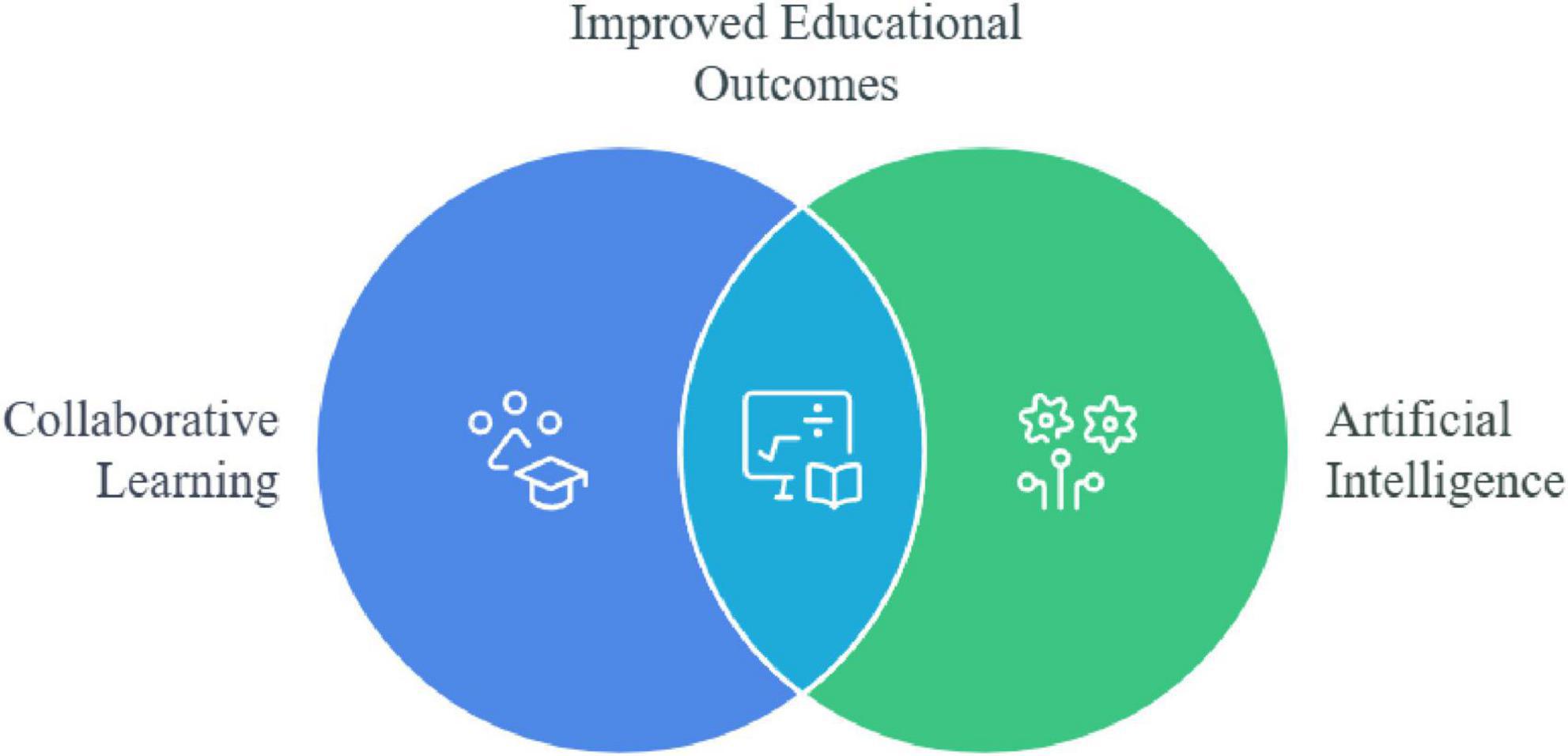
Figure 4. Synergy of collaborative learning and artificial intelligence (AI) in the educational process.
Personalized education
The use of adaptive systems enables the development of individualized learning pathways that take into account students’ knowledge levels, learning styles, and cognitive characteristics. By analyzing student data, the system can recommend appropriate materials and instructional methods, thereby enhancing engagement and academic success.
One of the key advantages of adaptive learning is its cyclical structure, illustrated in Figure 5, where each stage plays a vital role in shaping a personalized educational process. The first stage involves collecting data on students, including their academic performance, learning styles, and level of engagement. This data is then analyzed to identify individual needs and determine potential areas for growth. The next step is resource recommendation, where intelligent systems select materials that best match the learner’s proficiency level and interests. The final stage is performance assessment, which not only tracks academic progress but also informs future recommendations, ensuring a continuous cycle of improvement.
Adaptive technologies, in conjunction with AI, make it possible to:
1. Develop new skills necessary for working in the context of informatization and globalization.
2. Enable large-scale management of updates and the implementation of new technologies. Through shared access and system adaptability, each educational level receives new knowledge and tools in a balanced manner, helping to reduce existing gaps
3. Organize personalized selections of useful resources and materials based on user interests
4. Support productive and continuous learning within networked communities
5. Take into account users’ psychophysiological characteristics, thereby individualizing the learning process from the system’s side
6. Allow participants of networked communities to independently choose their own professional development trajectories and enhance their professional culture through collaboration and communication with peers
7. Facilitate systematic reflection on the learning process and professional activity within the networked community
8. Formulate an effective collaborative environment and a cooperative atmosphere to ensure successful interaction (du Plooy et al., 2024).
Integration of technologies
The implementation of modern technologies, such as large language models (LLMs), expands the possibilities of personalized learning. These technologies adapt to user queries by analyzing feedback and adjusting recommendations in accordance with the individual needs of students.
That’s how, review of the use of AI models in the academic and cognitive practices within higher education institutions demonstrates significant potential in enhancing engagement of students, support for instructors and the creation of innovative educational content are key areas of focus. Particular attention is given to personalized learning, multimodal AI systems, and modern forms of lifelong learning, all of which shape a new structure of interaction between participants in the educational process and digital technologies. At the same time, key ethical challenges remain - ranging from data privacy and algorithmic bias to issues of digital inequality.
Conclusion
The use of artificial intelligence in higher education opens substantial opportunities for personalized learning, increased student engagement, and optimization of administrative processes. However, the effective implementation of AI requires overcoming a number of challenges, including privacy concerns, ethical responsibility, and the risk of excessive dependence on technology. Future research in this area should be directed on evaluating the long-term impact of AI on educational outcomes, improving personalized learning algorithms, and ensuring equitable access to AI resources.
AI holds potential not only as a tool for process optimization but also as a transformational factor that fosters the development of new educational models based on individualization and continuous learning. In the context of rapid technological progress, it is critically important to create strategies for the responsible use of AI, aimed at maximizing the benefit to the educational community.
Data availability statement
The original contributions presented in this study are included in this article/supplementary material, further inquiries can be directed to the corresponding author.
Author contributions
NA: Writing – review and editing, Supervision, Project administration. RR: Conceptualization, Writing – original draft. MA: Writing – review and editing, Methodology, Formal Analysis. KC: Writing – review and editing, Resources. AB: Writing – review and editing, Visualization.
Funding
The author(s) declare that no financial support was received for the research and/or publication of this article.
Conflict of interest
The authors declare that the research was conducted in the absence of any commercial or financial relationships that could be construed as a potential conflict of interest.
Generative AI statement
The authors declare that no Generative AI was used in the creation of this manuscript.
Publisher’s note
All claims expressed in this article are solely those of the authors and do not necessarily represent those of their affiliated organizations, or those of the publisher, the editors and the reviewers. Any product that may be evaluated in this article, or claim that may be made by its manufacturer, is not guaranteed or endorsed by the publisher.
References
Abbasi, B. N., Wu, Y., and Luo, Z. (2024). Exploring the impact of artificial intelligence on curriculum development in global higher education institutions. Educ. Inform. Technol. 30, 547–581. doi: 10.1007/s10639-024-13113-z
Atchley, P., Pannell, H., Wofford, K., Hopkins, M., and Ann Atchley, R. (2024). Human and AI collaboration in the higher education environment: Opportunities and concerns. Cogn. Res. Principles Implicat. 9:20. doi: 10.1186/s41235-024-00547-9
du Plooy, E., Casteleijn, D., and Franzsen, D. (2024). Personalized adaptive learning in higher education: A scoping review of key characteristics and impact on academic performance and engagement. Heliyon 10:e39630. doi: 10.1016/j.heliyon.2024.e39630
eLearning Industry (2024). Navigating the AI wave in education: Opportunities and challenges. Greece: eLearning Industry.
Essel, H. B., Vlachopoulos, D., Tachie-Menson, A., Johnson, E. E., and Baah, P. K. (2022). The impact of a virtual teaching assistant (chatbot) on students’ learning in Ghanaian higher education. Int. J. Educ. Technol. High. Educ. 19:57. doi: 10.1186/s41239-022-00362-6
Koyuturk, C., Yavari, M., Theophilou, E., Bursic, S., Donabauer, G., Telari, A., et al. (2023). “Developing effective educational chatbots with ChatGPT prompts: Insights from preliminary tests in a case study on social media literacy,” in Proceedings of the 31st International Conference on Computers in Education (ICCE), (Taiwan: Asia-Pacific Society for Computers in Education (APSCE)).
Lytras, M. D., and Ordonez De Pablos, P. (2024). Guest editorial: Active and transformative learning in higher education in times of artificial intelligence and ChatGPT. Interact. Technol. Smart Educ. 21, 489–498. doi: 10.1108/ITSE-11-2024-252
Mulaudzi, L. V., and Hamilton, J. (2025). Lecturer’s perspective on the role of ai in personalized learning: Benefits, challenges, and ethical considerations in higher education. J. Acad. Ethics 1–21. doi: 10.1007/s10805-025-09615-119
Mustfa, M. J., and Ashiq, S. (2024). Harnessing the power of artificial intelligence for adaptive learning systems: A systematic review. Int. J. Educ. Manag. Eng. (IJEME) 14, 12–22. doi: 10.5815/ijeme.2024.05.02
Ocen, S., Elasu, J., Aarakit, S. M., and Olupot, C. (2025). Artificial intelligence in higher education institutions: Review of innovations, opportunities and challenges. Front. Educ. 10:1530247. doi: 10.3389/feduc.2025.1530247
Popenici, S. A. D., and Kerr, S. (2017). Exploring the impact of artificial intelligence on teaching and learning in higher education. Res. Pract. Technol. Enhanced Learn. 12:22. doi: 10.1186/s41039-017-0062-8
Pressbooks (2024). AI platforms and tools commonly used in higher education. Available online at: https://pressbooks.pub/etsu/chapter/ai-platforms-and-tools-commonly-used-in-higher-education/ (accessed April 25, 2025).
Qolamani, K. I. B., and Mohammed, M. M. (2023). The digital revolution in higher education: Transforming teaching and learning. QALAMUNA: J. Pendidikan Sos. Agama 15, 837–846. doi: 10.37680/qalamuna.v15i2.3905
Ramazanov, R. G. (2018). “Adaptivnost‘ setevy‘x soobshhestv kak faktor uspeshnogo professional‘nogo razvitiya pedagoga na protyazhenii vsej zhizni [Adaptability of online communities as a factor in successful professional development of a teacher throughout life],” in Vestnik rossijskogo universiteta druzhby‘ narodov. Seriya: Informatizaciya obrazovaniya.
Sain, Z. H., Shehu Lawal, U., Chansa Thelma, C., and Luqman Aziz, A. (2024). Exploring the role of artificial intelligence in enhancing student motivation and cognitive development in higher education. TechComp Innov. J. Comp. Sci. Technol. 1, 59–67. doi: 10.70063/techcompinnovations.v1i2.47
Shahzad, M. F., Xu, S., Lim, W. M., Yang, X., and Khan, Q. R. (2024). Artificial intelligence and social media on academic performance and mental well-being: Student perceptions of positive impact in the age of smart learning. Heliyon 10:e29523. doi: 10.1016/j.heliyon.2024.e29523
Sitterding, M. C., Raab, D. L., Saupe, J. L., and Israel, K. J. (2019). Using artificial intelligence and gaming to improve new nurse transition. Nurse Lead. 17, 125–130. doi: 10.1016/j.mnl.2018.12.013
Theasu (2024). Key examples of AI in higher education. Available online at: https://theasu.ca/blog/examples-of-ai-in-higher-education (accessed April 25, 2025).
Verma, N. (2023). How effective is AI in education? 10 case studies and examples. Los Angeles, CA: Axon Park.
Keywords: artificial intelligence, personalized learning, adaptive educational technologies, model of AI, intelligent tutoring system, educational analytics, automated assessment, collaborative learning
Citation: Abishev N, Ramazanov R, Abaideldanova M, Chesnokova K and Baizhumayeva A (2025) Artificial intelligence model in the cognitive and learning activities of university subjects. Front. Educ. 10:1623170. doi: 10.3389/feduc.2025.1623170
Received: 12 May 2025; Accepted: 25 June 2025;
Published: 15 July 2025.
Edited by:
Xiaoxun Sun, Australian Council for Educational Research, AustraliaReviewed by:
Pramila Ramani, Central University of Tamil Nadu, IndiaRadoslav Baltezarević, Institut za Medunarodnu Politiku I Privredu, Serbia
Copyright © 2025 Abishev, Ramazanov, Abaideldanova, Chesnokova and Baizhumayeva. This is an open-access article distributed under the terms of the Creative Commons Attribution License (CC BY). The use, distribution or reproduction in other forums is permitted, provided the original author(s) and the copyright owner(s) are credited and that the original publication in this journal is cited, in accordance with accepted academic practice. No use, distribution or reproduction is permitted which does not comply with these terms.
*Correspondence: M. Abaideldanova, bWVydWVydC5hYmF5ZGVsZGFub3ZhQG1haWwucnU=
†ORCID: N. Abishev, orcid.org/0009-0003-2239-3677; R. Ramazanov, orcid.org/0000-0002-0453-9690; M. Abaideldanova, orcid.org/0000-0002-3890-377X; K. Chesnokova, orcid.org/0000-0002-2690-7431; A. Baizhumayeva, orcid.org/0009-0002-2050-9608
 N. Abishev1†
N. Abishev1† M. Abaideldanova
M. Abaideldanova